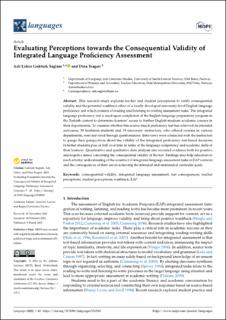Evaluating Perceptions towards the Consequential Validity of Integrated Language Proficiency Assessment
Journal article, Peer reviewed
Published version
Permanent lenke
https://hdl.handle.net/11250/2984323Utgivelsesdato
2022Metadata
Vis full innførselSamlinger
Originalversjon
Gokturk Saglam, A. L. & Tsagari, D. (2022). Evaluating Perceptions towards the Consequential Validity of Integrated Language Proficiency Assessment. Languages, 7(1), Artikkel 65. 10.3390/languages7010065Sammendrag
This research study explores teacher and student perceptions to verify consequential validity and the potential washback effect of a locally developed university-level English language proficiency test which consists of reading and listening-to-writing assessment tasks. The integrated language proficiency test is used upon completion of the English language preparatory program in the Turkish context to determine learners’ access to further English medium academic courses in their departments. To examine whether this source-based proficiency test has achieved its intended outcomes, 39 freshman students and 19 university instructors, who offered courses in various departments, were surveyed through questionnaires. Interviews were conducted with the instructors to gauge their perspectives about the validity of the integrated proficiency test-based decisions (whether students pass or fail) over time in terms of the language competency and academic skills of their learners. Quantitative and qualitative data analysis also revealed evidence both for positive and negative issues concerning the consequential validity of the test. Findings may help educators to reach a better understanding of the construct of integrated language assessment tasks in EAP contexts and the consequences of their use in achieving the intended and unintended curricular goals

